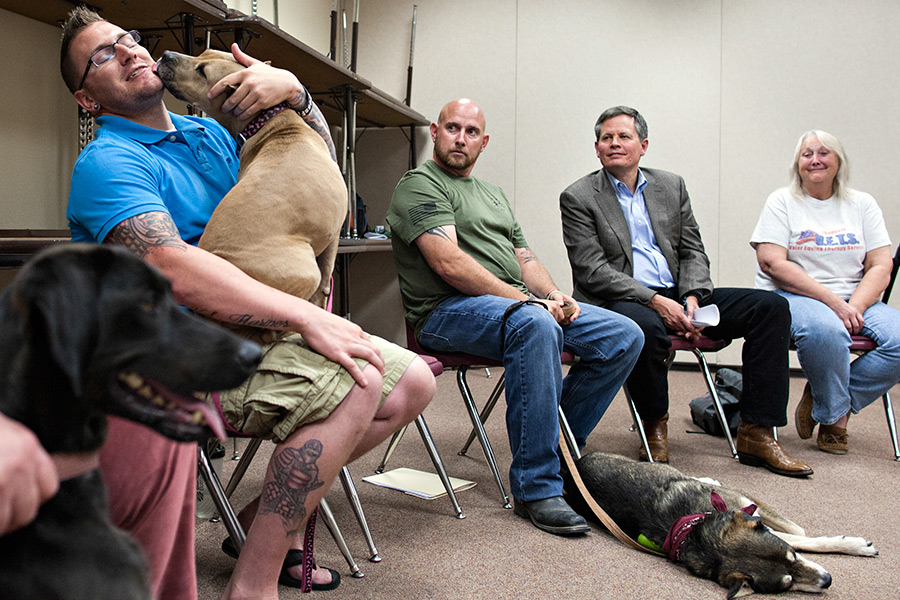It’s tough to argue against the value of a good dog. For centuries, they have been humankind’s protectors and confidants, our jesters and friends. And for many military veterans, a dog is also a lifesaver, a best friend, and a partner.
On July 18, Montana Congressman Steve Daines met with a group of these veterans at Flathead Valley Community College in Kalispell to discuss the lack of support from the Department of Veterans Affairs when it comes to service animals; in Montana, VA hospitals do not allow service animals to stay overnight at inpatient units or even come inside outpatient facilities.
Veteran Jeremy Sams told Daines he takes anxiety medication for his Post-Traumatic Stress Disorder (PTSD) from serving tours, but nothing has worked as well as having his 1-year-old dog, Apollo, by his side.
“It calms me down; he’s helped me a lot more than my medication,” Sams said. “It’s a relief to have him instead of taking more medication.”
Other veterans told Daines their service dogs are trained to sense their humans’ hyper-vigilant and hyper-aggressive states, and act to calm them down through licking, putting their canine heads on laps, and stepping between the veteran and anyone else.
Eric Hill has been working with his dog, Bella, for six years. She was a rescue dog, but he started training her to help him with some of his needs even while he was still active duty.
But there are still social and bureaucratic roadblocks when it comes to having a service dog, Hill said. Even as a student at Flathead Valley Community College, where he’s gotten Bella’s presence cleared with the administration, there are questions about her validity and necessity, since most of Hill’s injuries aren’t visible.
If she isn’t allowed to stay with him, Hill said, he doesn’t stay either. This can be detrimental to an education or a job, if the teacher or employer doesn’t understand the importance of such canine companions.
“I can’t be successful with working toward my future without having my partner here with me,” Hill said, as Bella climbed onto his lap.
The gathered veterans also explained the importance of the companionship they feel with their animals. Daniel Dorsett said that if it weren’t for his 13-year-old dog, Shiloh, he wouldn’t be alive.
“He’s the one who pushed the gun away from my head,” Dorsett said.
There isn’t an official group of service animal owners in the Flathead working toward making changes in the VA system, Ronda Kirby said, but rather a few individuals who came together because they wanted to make a difference.
Kirby, who served in the U.S. Army’s 101st Airborne Division in 2003 in Iraq, said her tour left her with PTSD and physical ailments that have rendered her a different person, and her service dog, Ressi, has helped her maneuver through life.
By getting Montana’s Congressional delegation involved, it may give more veterans the chance to get the help they need from service animals, Kirby said.
“This is a good opportunity to make a difference in millions of veterans’ lives,” she said.
Daines told the veterans that he sent a letter on July 17 to John Ginnity, the interim director at the VA Montana Health Care System, asking for him to use his authority to permit service, guide and therapeutic animals to stay overnight with “any patients admitted to any inpatient unit within the system” as well as making sure community-based outpatient clinics “accommodate Montana veterans with service animals.”
The letter continued: “I believe reasonable safeguards should be in place to help ensure that VA patients, employees, and the public are not as risk. These standards should not, however, unduly burden those who have served our nation from taking advantage of resources, inculding service animals, that can mitigate the negative impacts of post-traumatic stress, traumatic brain injury, and other mental or physical injuries.”
Community hospitals in Montana, as well as VA hospitals in other states, allow service animals, Daines wrote, and he hoped the same courtesy could be extended to Montana’s VA hospitals.
Many of the veterans spoke of how difficult it is to get timely service through the VA, which has undergone a major scandal and restructuring this year. When a recent report from the VA inspector general surfaced, it showed broad and deeply rooted problems, including long wait times, delays in patient care and manipulated waiting lists throughout the entire VA health care system.
Daines said there is potential legislation in the works about service animals, which touch on their inclusion in care and potentially prescribe a national system of validating these animals, to ensure their proper training and allow them the respect they deserve.
Currently, there is no uniform system in place that verifies a dog’s training or service abilities, the veterans said.
Bill Austin, a U.S. Army and Air National Guard veteran, trained his service dog, JP, a 150-pound Great Dane, and also works with others to train their dogs for free.
JP helps watch Austin’s back, keeps him calm when the flashbacks come, and he stands between Austin and anyone who might get a little too close. JP is large and garners plenty of attention in the public, and Austin also wants to help educate the public in that service animals can come in many shapes and sizes, and they’ve all got a job to do.
As far as JP’s significance in Austin’s life, it’s easy to see the connection; while other veterans were talking about their experiences, Austin reached down and softly stroked JP’s massive flank while the dog rested by his side.
It’s the best treatment he’s found for his issues, Austin said, and it beats medication in one major area.
“There are no side effects,” Austin said.
